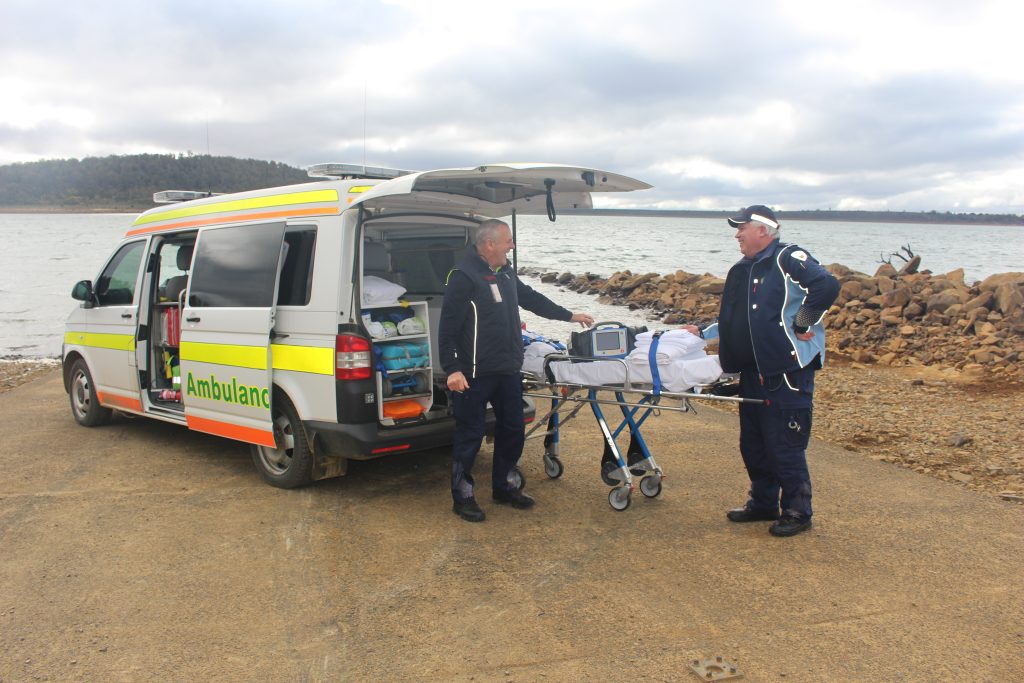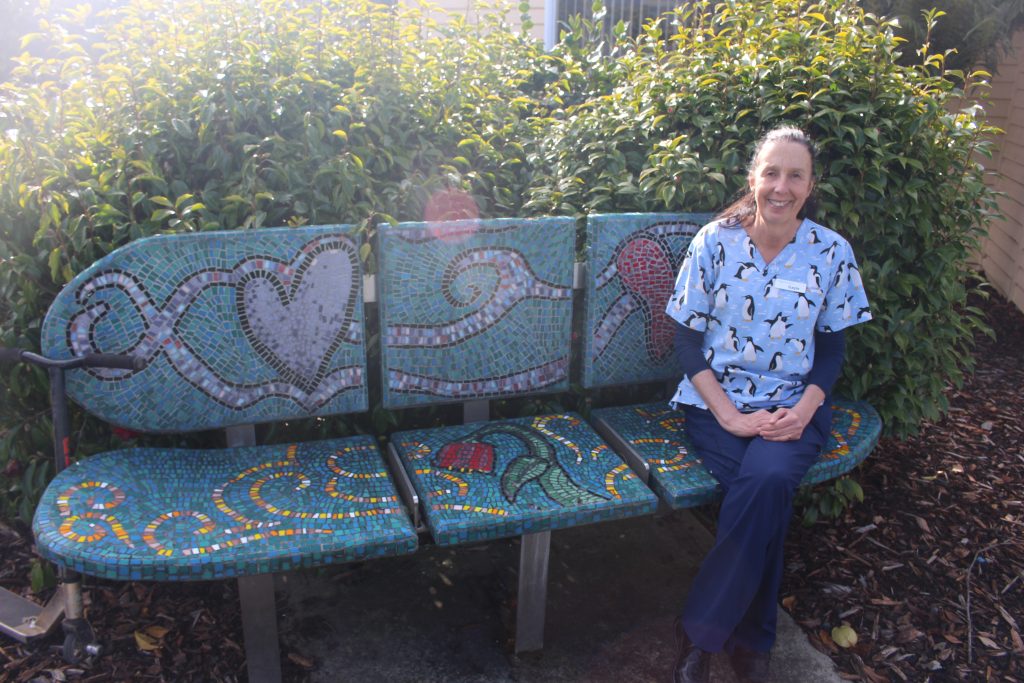Growing their own knowledge to serve their communities
Posted on December 19, 2024

How two scholarship recipients are improving healthcare outcomes in their local communities
Michael Walls and Gayle Rusher, recipients of Primary Health Tasmania’s Grow Your Own scholarships, are living examples that it’s never too late to expand your skillset and give back to your community.
Both recipients, now in their sixties, are using their scholarships to address critical healthcare gaps in Tasmania, having a direct impact on their local health workforce and their communities.
“The Grow Your Own scholarship opportunity emerged from the need to address pressing workforce challenges in rural Tasmania,” says Susan Powell, Primary Health Tasmania.
“We knew that by equipping local healthcare providers with the skills and qualifications to serve their own communities, we could create a sustainable model for improving healthcare access in areas where it’s often difficult to attract and retain professionals.”
For the past five years, Michael Walls has served as a volunteer ambulance officer in Miena – a small, remote town in Tasmania’s Central Highlands.
With the support of a Grow Your Own scholarship, Michael is now studying for a Diploma of Emergency Health Care, a course that is significantly enhancing his clinical skills and enabling him to better serve his community.
“I really appreciate the scholarship. It’s helping me learn more and provide better care for the community,” Michael explains.
“We get a certain level of training from Ambulance Tasmania, but a two-year, full-time course like this one is certainly going to improve my clinical skills and give me a lot greater knowledge. I’ll be a better clinician because of it.”
Miena is one of Tasmania’s most isolated communities, where access to both primary and emergency health care can be challenging due to its remoteness.
The town’s residents rely heavily on volunteers like Michael to provide immediate care, and his expanded skillset will enable him to handle a broader range of medical emergencies.
“Since COVID, we’ve had a paramedic stationed here. As volunteers, we provide back-up support and work as the assistant to the paramedic,” Michael says.
“In some cases, the paramedic might go to the most critical case, and I might first respond to the less acute one.”
Michael’s role as a volunteer involves much more than just responding to emergencies. In such a remote location, paramedics often serve as primary care providers for the community, handling everything from minor injuries to routine health checks.
“We get ambulance station walk-ins all the time,” Michael says.
“People will walk in and want their blood pressure checked, so we help them out. We have walk-in patients that might have a fishing hook caught in their ear or their cheek, and we can provide some basic level first aid care and then we can transport to hospital if needed.
“We’ve even had people walk in here while having a heart attack.
“Either way, we’re here to help them out.”
One of the most significant challenges facing the residents of Miena is isolation, which can take a toll on people’s mental health.
Michael says his growing expertise is proving invaluable in identifying mental health issues and referring people to the appropriate services.
“Living in such an isolated area, people’s mental health can suffer,” he says.
“You can identify mental health cases or substance abuse cases when you go to see them on another case. We’re trained to recognise those signs and connect them with support services.”
Thanks to his training, Michael is also acquiring advanced skills that are directly benefiting his community.
“The diploma will allow me to provide better patient prehospital emergency health care and assist our paramedics with management in more complex cases,” he says.
“This means I can offer better care to my community without having to rely so much on outside resources. It’s really affirming to be able to volunteer and know that what I’m doing is making a real difference.”
Michael’s colleague Tony Steedman, who has been a paramedic for 35 years, emphasises the crucial role volunteers play in rural health care.
“In a place like Miena, which is considered remote, the volunteers are essential,” Tony explains.
“Without them, Ambulance Tasmania would be at a huge loss. I’d be going out on my own, and that would create massive delays in treatment and transport.
“Michael’s training is giving him that next level of knowledge, which is a huge advantage.”

While Michael is improving pre-hospital emergency health care in the Central Highlands, nurse practitioner Gayle Rusher is focusing on filling healthcare gaps in the southern Huon Valley – particularly in women’s health.
With the help of her Grow Your Own scholarship, Gayle is studying for a Professional Certificate in Musculoskeletal and Sports Medicine, as well as completing an IUD insertion course – which will enable her to provide a wider range of services to her community.
“The scholarships are fantastic,” Gayle says.
“They’re really useful, especially for nurse practitioners like me. We’re on the lower end of the pay scale, so it can be difficult to afford additional training.
“This scholarship has allowed me to expand my knowledge and provide better care.”
Gayle’s dual certification is helping her serve a diverse range of patients in the southern Huon Valley, an area where access to specialised health care is often limited.
“I’m targeting different cohorts with my studies,” Gayle explains.
“The musculoskeletal and sports medicine course is helping me treat more conditions in-house rather than referring patients to other doctors. That means people can get the care they need closer to home.”
One of the primary benefits of Gayle’s additional training is her ability to diagnose and manage conditions like rheumatoid arthritis, which she previously would have referred straight away to a GP without any workup.
“Nurses weren’t taught about conditions like rheumatoid arthritis when I trained,” she says.
“This course is filling in the gaps in my knowledge, allowing me to manage these cases myself before referring on as clinically appropriate.
PULL QUOTE: It’s a game-changer for our patients because better collaborative care means they don’t have to travel to see a specialist.”
Gayle’s training in IUD insertion is also making a significant impact on women’s health services in the southern Huon Valley, an area where access to reproductive health care has been limited due to distance and cost barriers.
“The community here is skewed toward younger families, so there’s a real need for reproductive health services,” Gayle says.
“Having IUD insertion available locally reduces the need for patients to travel to Family Planning in Glenorchy, which is quite far for many of them.”
The ability to provide these services locally is not only more convenient for patients but also enhances their comfort and trust.
“It’s better for patients to have someone close to home, someone they know and trust,” Gayle explains.
“It also helps them feel a bit more in their comfort zone during what can be a very confronting procedure, like IUD insertion.
“So potentially the uptake is going to be better.”
Gayle’s commitment to improving healthcare access in her community is evident in her approach to patient care.
“It’s about equitable access to healthcare,” she says.
“People should have a choice—whether they want to go to Glenorchy, see a private gynaecologist or see a local practitioner like me.
“Offering that choice makes a big difference in how likely they are to follow through with their care.”
Growing their knowledge and sharing it
Both Michael and Gayle are passionate not only about improving their own skills, but also about sharing that knowledge with their colleagues and the wider healthcare community.
This collaborative approach is helping to build a stronger, more capable health workforce in two rural Tasmanian local government areas.
“This opportunity is part of a broader effort to support rural Tasmanian communities, developed in collaboration with local stakeholders in the Central Highlands, southern Huon Valley, and Tasman,” explains Susan Powell, Primary Health Tasmania.
“We aim not only to improve healthcare outcomes by enhancing local capacity but also to create long-lasting partnerships that benefit the wider health system.”
Gayle sees her role as a nurse practitioner as one of collaboration and mentorship.
“As nurse practitioners, our job is to collaborate with GPs, nurses, pharmacists, and whoever else comes through the door,” she says.
“We diagnose, assess, and manage both simple and complex cases, but we also learn from each other. The more knowledge we share, the better we all become as a team.”
Gayle’s passion for education extends to mentoring medical students who work alongside her who attend the general practice as part of their clinical practice.
“I love having med students and nursing students with me,” she says.
“I tell them to challenge me, ask questions, and be the devil’s advocate. It’s a learning process for both of us. They bring new guidelines and fresh perspectives, and I share my practical experience. It’s a win-win.”
Michael shares a similar mindset when it comes to working with his colleagues in Miena.
“We work as a team,” he says.
“Having more skills means I can help more and relieve some of the pressure on the paramedics. It makes a big difference in the outcomes for our patients.”
Both Michael and Gayle recognise the importance of continuing education and the role it plays in improving healthcare outcomes for their communities.
“With education, you shouldn’t have to pay for it, and you shouldn’t have to pry it out of people’s minds,” Gayle says.
“We’re here to share. When we share what we learn, it empowers everyone. Nurses become more productive, our whole team grows stronger, and we can share the load.”
This story features in Issue 19 of our Primary Health Matters magazine. Click here to read the rest of the issue.
